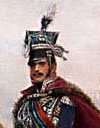By the evening of the 21st, Napoleon and the heads of his columns were at Kamienska, not far from Bobr, with the rear of his army (Eugene and Davout) still in the vicinity of Orsha. Then the whole army from the Emperor to the humblest private soldier heard an almost incredible piece of news which rallied their spirits and confidence. The subject of this sensation was Marshal Ney, who suddenly materialized at Orsha let in the evening at the head of 900 survivors of his corps. Ever since the 17th the army had given up the IIIrd Corps as hopelessly lost, and this unexpected return from the grave greatly raised morale. According to de Segur, Napoleon "leaped and shouted for joy, and exclaimed, 'I have saved my Eagles! I would sooner have given three hundred millions from my treasury than loose such a man.'" The Emperor immediately bestowed on the gallant Gascon the sobriquet of "Bravest of the brave."
Marshal Ney, Bravest of the Brave
This honorable title was undoubtedly fully deserved, and it is fitting at this point to look back and see what had happened to the IIIrd Corps since its separation from the main army. An order, dated 14th November at Smolensk, had instructed Ney to continue his role of rear guard, and to demolish the city on the 17th prior to following the main army westward. On the 15th, however, Napoleon decided to hasten the speed of the retreat, but by some oversight this order was not transmitted to Ney, who accordingly held his ground until the date specified in his original instructions, whereas under the new circumstances he should have left Smolensk on the 16th. Thus a sizable gap materialized between the IIIrd Corps and Davout's command (the formation next ahead), and this appeared to doom Ney and his men to almost certain death, or at best capture. Nevertheless, he set out at the head of his 6000 men, 12 guns and single cavalry squadron early on the 17th along the Krasnoe road.
From the first, his journey was beset with difficulties; there had been considerable snowfalls since the 5th, and the roads behind Napoleon's column were in terrible condition after the army's passage. Furthermore, the rear guard, last into Smolensk, had received less than its fair share of what scanty rations had been available, and its movement was seriously hampered by the hordes of desperate stragglers and the continuous harassing raids of Cossack partisans. Its rate of advance was consequently not very great, and by the time the IIIrd Corps reached Krasnoe on the 18th, Milradovitch had found had found time to place a vastly superior force across its path. The Russian general sent out an emissary to demand Ney's capitulation, but neglected to order his guns to cease fire during the parley. Ney's reply was typical: "A Marshal never surrenders; there is no parleying under an enemy's fire; you are my prisoner." All attempts to break through the Russian position proved unavailing, however, and toward dusk Ney drew off his men to the Village of Danikova, north of the road, and there built a large number of bivouac fires. But his men were to have no rest because as soon as it was dark they were on their way northward, heading for Syrokorense on the Dnieper; while their enemies, lulled into a sense of false security by their massive superiority of force and the sight of the glowing campfires to their front, failed to notice the escape. The going was terribly hard -- only one accurate map was available -- but by dawn on the 19th Ney was well on his way. Of course, the Russians discovered their mistake by daybreak, and Platov was soon on his way at the head of a multitude of Cossacks accompanied by several batteries of horse artillery to wipe out the impudent French column. Ney calmly formed his men into square and, musket in hand, continued his course. Shortly after midnight, the IIIrd Corps reached Gusinoe on the riverbank, and the next morning found a remnant of Ney's men on the further side, but without their guns which tey had been forced to abandon. Fourty-five miles still separated them from Orsha, but throughout the 20th and 21st, the march continued despite repeated Cossack attacks, all of which were repulsed by the gallant though steadily dwindling band. Ney's difficulties steadily increased, but a Polish officer got through to Eugene with an appeal for aid during the 20th, and the Viceroy was able to send out troops to cover the last stages of the Duke of Elchingen's epic withdrawal.
Such dauntless courage and stubborn resolution inspired the whole army; Ney's almost miraculous escape appeared a happy augury for the trials ahead.
~ D. Chandler, The Campaigns of Napoleon, p.830-831























































No comments:
Post a Comment